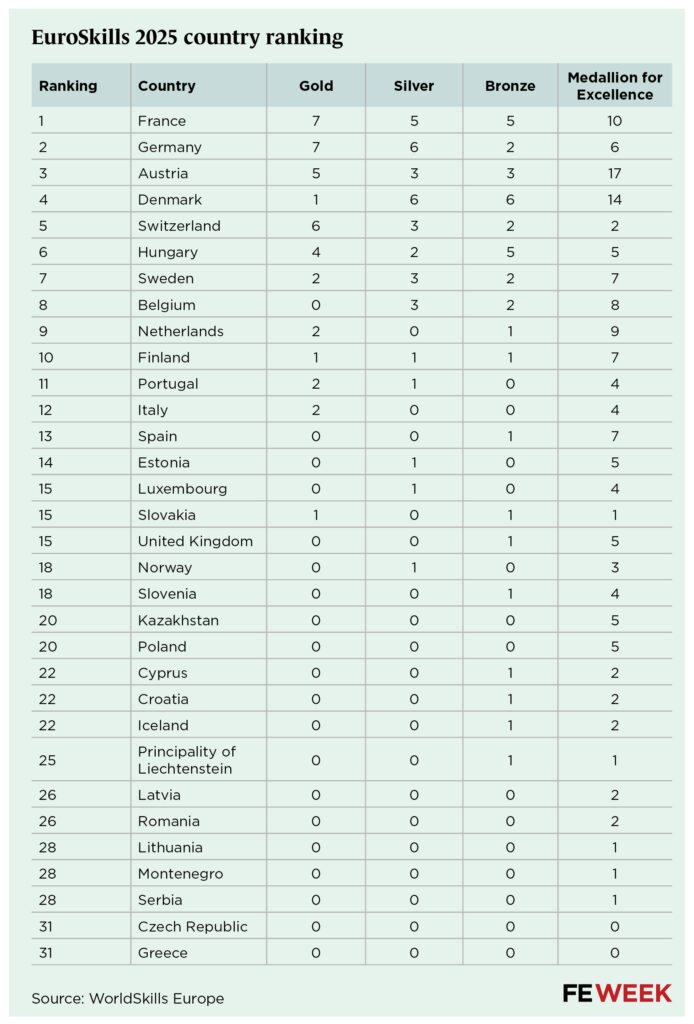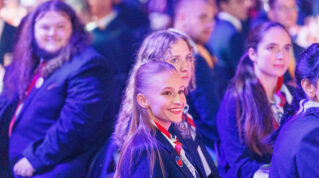Though Team UK did the country proud in Herning with its haul of six medals, its 15th place in the medal table was its lowest in recent years. Anviksha Patel spoke to WorldSkills UK to find out why the UK went backwards
In the hours after the EuroSkills closing ceremony last weekend, Team UK’s competitors were determined to return to training and “go for gold” at next year’s global competition in Shanghai.
But despite the positive attitudes, there was no hiding from the fact that 15th place ranked Team UK alongside Luxembourg and Slovakia in the table of 33 competing countries.
WorldSkills UK chief executive Ben Blackledge hailed his competitors’ “mature approach” after winning a bronze and five medallions for excellence, but revealed some rival countries selected more experienced competitors in Denmark.
“The amount they’ve learned and the amount of people on the flight saying, ‘we want to go home and train’, it was really positive,” he said.
“But we knew that we were going up against more experienced competition.
“Reflecting on that, it makes me really proud of their performance, but we always want to do better.”
Blackledge explained EuroSkills has grown in size and prestige since its launch in 2008, meaning the quality of competition has risen.
EuroSkills is the first international pressure test for many members of Team UK and forms the first part of WorldSkills UK’s two-year competition cycle, so it is not the pinnacle of competition for the UK, unlike some other European countries.
“We always go in knowing that we’ve got competitors who are relatively new to our programme. And this year, we’ve got some training managers who are also new.
“There is always a tension between performance and learning.
“We’ve got to make sure that we’re still close enough to achieving gold, silver and bronze, but also we are the only European country that has a Centre of Excellence.
“We’re the only country that is looking at how to use medals for more than prestige.”
As he looks ahead to WorldSkills Shanghai, the chief executive faces a tough financial outlook.
Funding from the Department for Education has declined year on year and WorldSkills UK now raises more from commercial income than it receives from government grants. Last year the DfE cut its grant by 15 per cent to £5.7 million.
Blackledge said the charity aimed to grow commercial income through “cash and value in kind” via industry-leading specialist training and cutting-edge equipment.
“There is more work for us to do around the collective employer voice, because looking at Germany and Switzerland and Hungary, they have strong chamber engagement and government and industry partnerships are backing their work,” he added.
But Blackledge hailed skills minister Jacqui Smith’s visit to Team UK last week which he said provided a “real boost”.
“There is absolutely value in having public support for the work we’re doing,” he said.
“We want to get Number 10 and Number 11 more involved and say, WorldSkills UK is part of our growth strategy and flying the flag for the UK.”
Blackledge added that whilst there was no prospect of extra money from the government, there was value in being embedded in policy and strategy.
Among the criteria to achieve ‘exceptional’ for participation and development in the new Ofsted inspection toolkit is a reference to “having internal and external competitions”.
Being a member of the WorldSkills UK Centre for Excellence, and having learners take part in WorldSkills UK competitions, was also listed as a selection criteria in the recent bidding round for construction technical excellence colleges.
Meanwhile, skills minister Smith hinted at “support for WorldSkills” in the upcoming post-16 white paper.

















Your thoughts